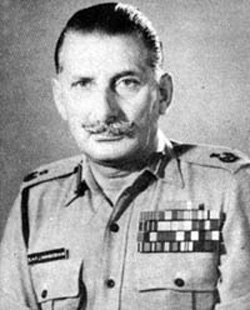Now almost 90, he stands as straight as an arrow, and like a good soldier can look down over a belt that does not sag over a flat stomach, and sees his shoelaces. And, like a good soldier he does not dye his hair or his bristling moustache. They have grown into a natural, distinguished and greyish.
Field Marshal Sam Maneckshaw
Sam Bahadur, as he was lovingly called, was born in Amritsar in 1914. And his hobbies were gardening and cooking. The CIJWS was established on May 1, 1970 at the initiative of India's Field Marshall Sam Maneckshaw, who was then the GOC of Eastern Command. Its motto was 'Fight the Guerrilla like a Guerrilla'. He was best known for his flamboyance. The Indian Army Chief General Sam Maneckshaw had won the Military Cross in WW II in 1942. To the Indian public, it was General Maneckshaw with his twirled moustache, Gorkha cap and baton, the symbolic hero.
The brief tip off given by General Maneckshaw to the Eastern Command was very limited. The aim was to occupy only two areas of East Pakistan - Chittagong and Khulna - so that an interim Bangladeshi government could be established. The capture of the whole of East Pakistan was not even conceived. A major problem was the geography and terrain of East Pakistan. Three major rivers – the Brahmaputra, the Ganges and the Meghna - divided East Pakistan into four natural regions.
The Pakistanis for the most part, were completely taken by surprise. Within Six days of the war, Indian troops were storming deep inside East Pakistani territory and moving fast. The 1971 war was one occasion when the Indian political leadership exhibited a proper understanding of the use of military power for achieving a clear national aim. The Indian Navy's chance to see some action came only in 1971 war.
The Chinese were then firm Pakistani supporters. The General had to keep a watchful eye on the long and difficult Chinese borders and at the same time, ensure that his Eastern Army secured its objective of grabbing a good chunk of East Pakistani territory within two to three weeks. His military discipline and loyalty to the leadership was such that even when Sam offered to quit over pressure to attack East Pakistan prematurely in early 1971, he disagreed with Indira Gandhi only over the timing and not the basic military strategy.
In 1971, just prior to the Indo-Pak war, Prime Minister Indira Gandhi, on hearing I.B report, sent for the then Chief of Army Staff, General (later Field Marshal) Sam Maneckshaw at 11.00 p.m. one night. Since he was scheduled to brief the Prime Minister at 8.00 a.m. next morning, he suggested that she could discuss the points she had in mind next morning. The Iron Lady, however, was adamant. So the General went to her residence at that unearthly hour. Indira Gandhi told him that she had heard a rumour that he was about to launch a coup d'etat.
Her problem was that, she had heard on the grapevine that the Field Marshal was contemplating steeping in to sort out the messy political situation. She asked him whether there was any truth in the rumour. Unfazed and in his usual cool and calm manner, he asked her as to what was her personal opinion on this score. She replied, 'I don't think you could do such a thing!'
Maneckshaw then gave a fitting reply. “Madame Prime Minister, you have thoroughly underestimated your Chief of Army Staff. I can launch a coup tomorrow, but I won’t! Little girl, I have a big and long nose as you do. You keep your nose out of the affairs of my army and I will keep my nose out of the affairs of your government. Now run along, and try and sort things out.” It is only self-discipline which enabled such a powerful man to give such a simple negative answer. A statement made by the retired Field Marshal was that, he firmly believes that the future should be handed over to women of substance because he knew for sure that they would build a better world than the mess men have made of it. Indeed, a tall man with modest aims, ambitions and actions!
This incident gives us an idea of the psyche of the Indian Army. They have time and again exhibited their unstinted loyalty to the country and it’s Constitution, to the core. Sam, Chanakya with a gun, has successfully trapped 'Mowu Angami' a self-styled Naga general and his men infiltrated into India. The 14-day war with Pakistan in 1971 still speaks volume about Sam. Indian army, under his command had 93,000 Pakistani Soliders surrendered, a record in any military operations. According to Mr. J.J. Singh, the present Army General, "Sam would remain an epitome of an officer and a gentleman". It is said that, "Old soldiers never die, they just fade away". But Sam will remain an exemption to it.



